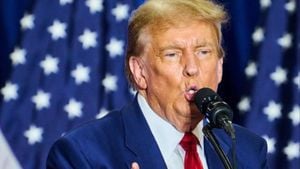Following the latest developments surrounding the financial impact of Donald Trump’s election campaign, economies across Central Europe are feeling the pressure as investors brace for uncertainty. The emphasis on fluctuated U.S. policies post-election has sent ripples through global markets, adding to the anxiety for nations connected economically to the U.S.
The Hungarian forint has particularly faced significant strain, having hit its lowest value since December 2022. This depreciation can be linked directly to fears surrounding Trump’s potential return to the presidency and the consequent strengthening of the U.S. dollar. These fears are primarily fueled by Trump’s proposed economic policies, which some analysts believe could lead to stricter fiscal measures and inflationary spikes.
Countries like Poland and the Czech Republic are similarly feeling the effects. The Polish zloty, after flirting near its five-month low, managed to inch upwards thanks to the central bank’s decision to keep rates steady. On the other hand, the Czech crown struggled, dipping to three-month lows before stabilizing.
The crux of the issue lies not only with the U.S. election results but also with the broader picture of global economics. Rising concerns over inflation have investors on edge, particularly as Trump’s policies promise tax cuts and the potential for tariffs—these factors could shift economic dynamics significantly. If inflation rates rise, the U.S. Federal Reserve may respond by adjusting interest rates, which could inadvertently place more strain on Central European currencies.
"The interplay between U.S. and Central European economics is delicate," one economic analyst stated, highlighting the tightrope walk many of the nations are currently performing to navigate these new economic norms. Investors have recently reported mixed performance on market indices, with Budapest experiencing a notable rise of over 22% annually, contrasted by Warsaw's decline of 4.55%. This mixed performance points to increased volatility and investor wariness as market players adapt to shifting landscapes.
Complicated by global geopolitical concerns, particularly those growing tensions within the Middle East, Central European economies are facing new challenges. The potential economic fallout from conflicts or diplomacy can easily flow back to affect currency strength and trade relations, especially for smaller economies more reliant on exports and imports.
Many experts warn of looming turbulence for these economies, anticipating deteriorated trading conditions and financial constraints should the dollar continue to strengthen. For investors and governments alike, the significant question remains—how do businesses and markets recalibrate to sustain growth amid fluctuated economic tides?
Given the backdrop of global uncertainty, many Central European nations now find themselves adjusting their fiscal policies, with some central banks hinting at rate cuts to stimulate growth. The Czech central bank, for example, is contemplating easing measures to balance the effects of what might be higher rates from the U.S. Fed.
This complicated dance implies potential consequences for inflation rates, since devaluations tend to increase the cost of imports. With nations dependent on trade ties to countries like the U.S., ensuring healthy economic dialogue is more pivotal than ever. For many, the lessons learned from past economic crises serve as potent reminders of how quickly situations can shift.
Looking forward, the broader economic picture serves to remind all invested parties of the fragile interdependencies created by globalization. Whether it's through currency flux, rate changes, or shifts triggered by political swings, Central Europe’s immediate future lays uncertain. Stakeholders are urged to remain vigilant, as the potential economic ripple effects catalyzed by the U.S. elections could reverberate far beyond their borders.



